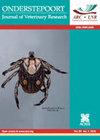Development of a Real-time TaqMan PCR Assay for The Detection of Porcine Circovirus 4
IF 1.6
3区 农林科学
Q2 VETERINARY SCIENCES
引用次数: 3
Abstract
Abstract Introduction Porcine circovirus 4 (PCV4) was first discovered in 2019 in a herd of pigs with porcine respiratory disease, dermatitis and nephropathy syndrome in Hunan Province, China. It has subsequently been detected in other provinces and in South Korea. In consideration of the potential of the virus to cause an epidemic, rapid, sensitive, and specific detection of PCV4 is needed, as is the facilitation of further epidemiological research through elucidation of the whole genome of PCV4. This study had those two aims. Material and Methods Fifty-five blood samples, two pig tissue samples, nine saliva swabs and one semen sample which all originated from Sichuan province pig farms were analysed. The virus’ genome of 1,770 bp was synthesised artificially based on a Chinese reference strain and primers and probes for the ORF2 gene were designed. Then, the amplified target fragment was cloned into the pMD19-T vector and a series of diluted recombinant plasmids were used to generate a standard curve. An optimised real-time TaqMan PCR method was established. Results The results of this study showed that the established method is specific for PCV4 but not for other viruses, and has amplification efficiency of 99.6%, a regression squared value (R2) of 1.000 and a detection limit of 2.2×10 DNA copies. This method was shown to be analytically specific and sensitive with a low intra- and inter-assay coefficient of variation (<1.67 %). Of a total of 67 clinical samples tested using the established method, three were shown to be positive (4%). Conclusion This study confirms the existence of PCV4 in Sichuan and provides a promising alternative tool for rapid detection of PCV4.猪圆环病毒4型实时TaqMan PCR检测方法的建立
猪圆环病毒4型(PCV4)于2019年首次在湖南省猪呼吸道疾病、皮炎和肾病综合征猪群中被发现。随后在其他省份和韩国也发现了这种病毒。考虑到该病毒可能引起流行,需要快速、灵敏、特异地检测PCV4,并通过阐明PCV4全基因组为进一步开展流行病学研究提供便利。这项研究有两个目的。材料与方法对来自四川省养猪场的55份血液样本、2份猪组织样本、9份唾液拭子和1份精液样本进行分析。基于中国参考株人工合成了该病毒1770 bp的基因组,设计了ORF2基因的引物和探针。然后将扩增后的目标片段克隆到pMD19-T载体上,用一系列稀释后的重组质粒生成标准曲线。建立了一种优化的实时TaqMan PCR方法。结果建立的方法对PCV4有特异性,对其他病毒无特异性,扩增效率为99.6%,回归平方值(R2)为1.000,检测限为2.2×10。结果表明,该方法具有较低的分析特异性和敏感性,分析内和分析间变异系数< 1.67%。在使用既定方法检测的67个临床样本中,有3个呈阳性(4%)。结论本研究证实了PCV4在四川地区的存在,为PCV4的快速检测提供了一种有希望的替代工具。
本文章由计算机程序翻译,如有差异,请以英文原文为准。
求助全文
约1分钟内获得全文
求助全文
来源期刊
CiteScore
4.30
自引率
0.00%
发文量
13
审稿时长
16 weeks
期刊介绍:
The Onderstepoort Journal of Veterinary Research, is the official publication of the Onderstepoort Veterinary Institute. While it considers submissions from any geographic region, its focus is on Africa and the infectious and parasitic diseases and disease vectors that affect livestock and wildlife on the continent.

 求助内容:
求助内容: 应助结果提醒方式:
应助结果提醒方式:


